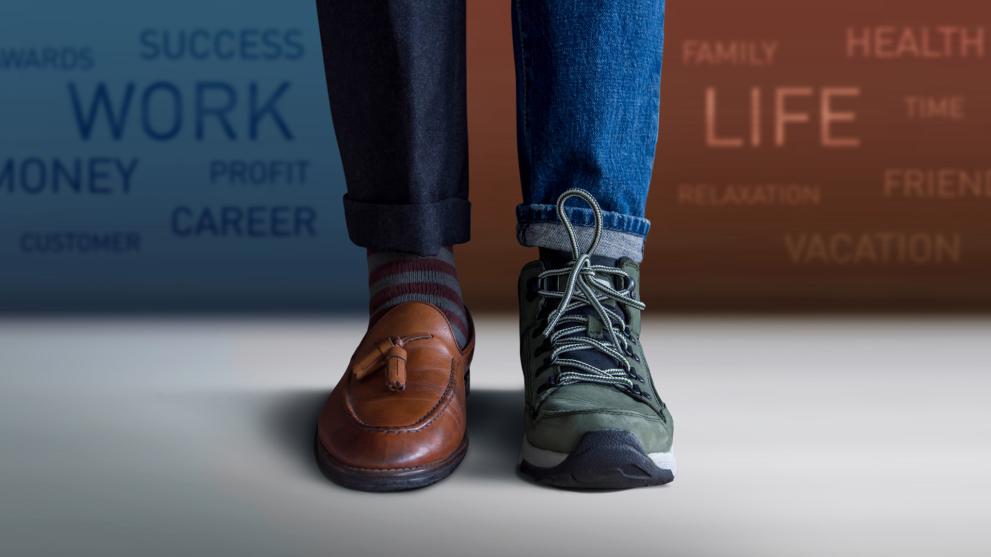
The global pandemic brought about significant changes to the way we work. Remote work, initially conceived as a necessity in the early days of the pandemic, has now been established in the hybrid work model, its many advantages recognised by employers and workers alike. However, it has also made it more difficult to set clear boundaries between work and the rest of our lives.
Indeed, there is so much talk lately about ‘work-life balance’, but what exactly does it mean and why is it so important?
Work-life balance refers to achieving the right equilibrium between your professional and personal life. While this may look different for everyone, one thing is certain: this balance is important not only for your physical and mental well-being, allowing you the time and space to pursue other interests and cultivate your personal relationships, but also for your productivity, leading to better results and increasing job satisfaction.
So, how do you get there? Despite the constant pressure to always be performing at the highest level, there are ways to foster balance between work and personal time. Here are some ways you can do that.
Prioritise
Write down your tasks in order of importance and be realistic about what you can achieve in a given day. You will probably never get to the bottom of that to-do list; letting this become your goal will only lead to increased stress and an overall sense of dissatisfaction about your performance, which, in turn, creates negative feelings around your work.
Set clear boundaries between work and personal time
This is harder to do when you are working from home; try to keep a separate space where you do your work, from which you can physically remove yourself at the end of the work day. If that is not possible, mark the transition in a way that your brain registers it’s time to switch off. For example, shutting your computer means that you will no longer be sucked into work-related email.
Take that holiday
To perform your best, you need to ‘sharpen the saw’ regularly. Taking time off work will help you disconnect and recharge, allowing you to return with a renewed perspective and able to tackle your workload more effectively.
Know your limits
Become clear with yourself and your superiors about how much work you can take on. Keep saying ‘yes’, and you might find yourself on the edge of burnout. Delegate tasks when possible, and don’t be afraid to speak up when confronted with unrealistic expectations.
Talk about it
If you feel you are struggling to balance your work and personal life, talk to someone from your organisation you trust. It might be your manager, your HR representative, or a co-worker whose advice you value; they can help in different ways, from redistributing your workload to helping you reshift your mindset.
Schedule it, or it won’t happen
Be as intentional about your time off as you are about your work. Put on your calendar not only your deadlines and work appointments, but the rest of your life, too: hobbies, personal pursuits, and social plans. And most importantly, stick to them.
Want to find out more about how to achieve a fulfilling balance between your career and personal life? Read our article Feeling burnt out? We can help!
Related links:
What to do when you feel overwhelmed at work
How to reduce employee stress and prevent burnout
Why you should always use your annual leave
Read more:
Find EURES Advisers
Living and working conditions in EURES countries
EURES Jobs Database
EURES services for employers
EURES Events Calendar
Upcoming Online Events
EURES on Facebook
EURES on X
EURES on LinkedIn
EURES on Instagram
Details
- Publication date
- 5 April 2024
- Authors
- European Labour Authority | Directorate-General for Employment, Social Affairs and Inclusion
- Topics
- Hints and tips
- Related section(s)
- Help and Support
- Hints & tips
- Living and Working
- Sector
- Accomodation and food service activities
- Activities of extraterritorial organisations and bodies
- Activities of households as employers, undifferentiated goods- and services
- Administrative and support service activities
- Agriculture, forestry and fishing
- Arts, entertainment and recreation
- Construction
- Education
- Electricity, gas, steam and air conditioning supply
- Financial and insurance activities
- Human health and social work activities
- Information and communication
- Manufacturing
- Mining and quarrying
- Other service activities
- Professional, scientific and technical activities
- Public administration and defence; compulsory social security
- Real estate activities
- Transportation and storage
- Water supply, sewerage, waste management and remediation activities
- Wholesale and retail trade; repair of motor vehicles and motorcycles